Appearance of the Correctional Service of Canada before the Standing Committee on Health (HESA): June 15, 2020
Briefing on the Canadian response to the outbreak of the coronavirus
June 15, 2020 From 12:00 P.M.To 3:00 P.M.
Table of Contents
Briefing on the Canadian response to the outbreak of the coronavirus
1. Opening Remarks
Speaking Notes for
Anne Kelly
Commissioner
Correctional Service of Canada
For an appearance before the
Standing Committee on Health (HESA)
June 15, 2020
Check against delivery
- Good Afternoon Mr. Chair and members of the committee.
- Thank you for inviting me here today. I appreciate the opportunity to update you on the measures taken by the Correctional Service of Canada in response to the COVID-19 pandemic.
- I would like to start with a brief update on the current status of COVID-19 cases in our institutions before continuing with an overview of CSC’s testing approach, lessons learned, and plans moving forward.
- Mr. Chair, I am very pleased to be able to report that, thanks to the tireless efforts of staff, and due to the exceptional measures taken, we only have one remaining active COVID-19 case among inmates across our 43 institutions.
- Since the pandemic began, we have had outbreaks in five of our 43 institutions, with 360 inmates testing positive out of a total of 13,900 inmates; 357 or 99% have fully recovered; one inmate from the Federal Training Centre in Quebec remains in hospital, but not in the Intensive Care Unit; and, we have had two deaths.
- Of the five outbreaks, four have fully resolved. Our last outbreak at the Federal Training Centre in Quebec will be declared over this week, on June 16, if there are no new cases.
- Among CSC staff, out of 142 of our employees who have tested positive to date, 132 or 93% have fully recovered.
- I want to take this opportunity to recognize the extraordinary efforts made by our employees for their ongoing work under these exceptional and challenging circumstances.
- From the outset of the pandemic, the Correctional Service of Canada took a proactive approach, guided by public health authorities, and working closely with our union partners, to ensure the health and safety of staff and offenders in all of our institutions.
- When the pandemic was declared, we focused heavily on preventing the introduction of the virus in our institutions by quickly suspending visits from the public; temporary absences, except when medically necessary; work releases; and interregional transfers.
- Once the virus was introduced into a facility, the goal became the prevention of its spread, and included measures such as:
- Strengthening infection and prevention control measures and cleaning/disinfecting protocols
- Actively screening all staff at the front entrance
- Moving to unit-based staffing, to prevent staff rotation throughout the institutions
- Training staff and providing them with masks and eye protection
- Limiting the movement of inmates, and adapting practices to support physical distancing
- Conducting daily wellness checks for signs of symptomatic inmates
- Immediately testing for Covid-19 anyone reporting symptoms
- Medically isolating for 14 days inmates with symptoms, or who had tested positive for the virus, or who were being admitted to federal custody
- Working with local public health authorities to ensure inmates’ access to local hospital care, if required, and finally
- Implementing our own tracing capability by training over 200 of our employees
- In addition, CORCAN, which is a Special Operating Agency of CSC providing employment to inmates, has reconfigured its shops and, to date, has produced over 150,000 disposable masks, 35,000 washable masks and 6,500 disposable gowns.
When the outbreak occurred at Mission Institution in BC, CSC worked with its public health colleagues and had reviews conducted at that institution. One review was conducted by Fraser Health authority, and the second was conducted jointly by a PHAC Infection Prevention and Control expert, and an OSH expert from Health Canada.
CSC then worked with PHAC and local health departments and community experts to have independent, expert-led reviews completed in all of its facilities.
To date, all 43 of CSC’s institutions have had an Infection Prevention and Control, or an Environmental Health review completed.
There is recognition in the reviews completed to date that Covid-19 is difficult to contain in closed environments and the consistent acknowledgement of the strong frontline leadership and the commitment of staff to preventing and containing the spread of the virus.
There is also a reminder of the importance of
- training staff on donning and doffing PPE;
- having strong cleaning and disinfecting practices, such as strategic placement of hand sanitizing stations; and
- limiting the movement of staff and inmates to prevent spread
None of the findings are insurmountable but they will require continued focus and new investments to be sustainable in the months, and possibly years, to come. Work is currently underway to ensure CSC is well positioned moving forward.
Now I would like to speak briefly about the steps we have taken to rapidly identify and contain Covid-19 and our “Testing Strategy”.
First, Health care staff actively screen and monitor all inmates for Covid-19 symptoms.
As previously mentioned, CSC medically isolates for 14 days:
- inmates who are newly admitted to CSC or returning to CSC as a result of a suspension or revocation of their release
- inmates who have symptoms or have tested positive, until medically cleared
- any close contacts of an inmate who has tested positive, or has symptoms of COVID-19,
- inmates who are released to the community from an institution where there is an outbreak
CSC physicians use the PHAC recommended approach to medically clear inmates, meaning the recovery period is a minimum of 10 days, of which 2 days must be symptom free.
With respect to staff, any employee who is symptomatic or has tested positive must self-isolate for a minimum of 10 days, including two consecutive days symptom free. Any close contacts of a staff member that has tested positive must also self-isolate.
Currently, CSC tests symptomatic inmates and staff, completes contact tracing, and offers testing to those in close contact.
CSC also tests inmates and staff who are at risk of contracting Covid-19 when there is an outbreak. For any positive test, contact tracing is completed and testing offered.
Moving forward, CSC will offer testing based on its recently revised comprehensive and expanded testing strategy. The strategy is responsive to CSC’s closed environment, is well received by the Unions, and exceeds most, if not all, provincial testing strategies.
- In addition to the testing currently completed, the expanded testing strategy includes:
- Testing of all inmates at time of admission or return to federal custody. This is in addition to the 14 day medical isolation that will continue. CSC will offer the testing at around day 10 so it can have the results of the test prior to placing the inmate in general population.
- Testing of all inmates prior to their release to the community. The timing of the testing may vary depending on the jurisdiction and how quickly the test results can be made available. Positive results will be reported to the local public health authorities, and a plan jointly developed.
- We are expanding the testing of staff and inmates in institutions located in areas where the rate of community transmission is elevated (i.e. where there are 10 cases or more per week per 100,000 population), which is called “asymptomatic surveillance”.
- For any positive tests, contact tracing would be completed and testing offered. The testing would be offered again over several weeks or months as long as the institutions remain in the “hot zones”.
There are currently 5 areas in the Quebec region that have high rates of community transmission. There are seven institutions located within those five “hot zones”. Of note, testing has been offered to all staff working in the institutions in the Laval area.
One interesting fact is that when CSC has done mass testing at outbreak sites, 43.5% of inmates with positive test results reported being asymptomatic on daily wellness checks and at the time of testing. Since this time, health staff have re-interviewed many of these inmates and a significant percentage have subsequently disclosed that they were symptomatic but chose to not disclose their symptoms, and the symptoms were so mild that health care staff were not able to identify them without the inmate’s disclosure during wellness checks. The plan going forward is to re-interview all asymptomatic COVID-19 positive inmates.
CSC currently has sufficient capacity to test all symptomatic inmates, which it is currently doing. However, the expanded testing capacity outlined today can only be achieved through partnerships, as this level of testing requires significant medical and material resources, which CSC does not have.
CSC has already begun reaching out to health partners to increase its capacity through MOUs with public health authorities as well as contracts with private labs, such as Dynacare. The strategy will be implemented in a phased approach over the next several weeks or months as MOUs and contracts are finalized. As soon as negotiations for access to lab capacity are completed, CSC will start offering testing to inmates upon admission and or release.
In order to prevent and contain the spread of COVID-19 in the months to come, especially as CSC starts easing some of the restrictions it imposed, the expanded testing strategy will be of critical importance.
Although the institutions were never closed, measures were taken to prevent and contain the spread of the virus; visits were suspended and programming was curtailed.
To shape our “new” normal and look at lifting any restrictions, I have put in place a governance structure made up of subject matter experts, union representatives and senior managers from different sectors of CSC, including regional representatives. External representatives are also involved including Citizen Advisory and criminal justice partners.
This approach allows us to examine what needs to resume and when, the safeguards that need to be put in place, and how that would roll out. Our approach will be gradual, likely vary across different regions, and take into account public health advice.
As a first step, we will be looking at reinstating small group programming for inmates at some institutions, as this is key to their successful rehabilitation and to public safety.
In conclusion, as I say often, there is no greater responsibility than having the care and custody of other human beings. As Commissioner, I appreciate the work of our staff, partners, stakeholders, and volunteers for their amazing efforts during these unprecedented times.
Thank you, Mr. Chair and members of the committee, for providing me with the opportunity to appear before you today. I would be happy to respond to any questions you may have.
2. Key Facts and Figures on COVID-19
COVID-19 Cases
Currently, across the country, there is one active case of COVID-19 in one out of the Correctional Service of Canada (CSC)’s 43 institutions. The active case is at the Federal Training Centre, a multi-level security facility in the Quebec Region. There are no identified cases in the Atlantic, Ontario, Pacific or the Prairie Regions.
As of June 10, 2020:
- A total of 1,297 tests have been administrated and 8 tests are pending;
- 360 inmates have tested positive, and 357 or 99% have recovered;
- One inmate from the Federal Training Centre, a multi-level security facility in the Quebec Region, remains in hospital;
- Two inmates died of apparent complications related to COVID-19; and,
- Out of 142 CSC employees who have tested positive, 130 or 92% have recovered.
Release of Inmates
CSC and the Parole Board of Canada (PBC) are working collaboratively to facilitate the safe release of federal inmates into the community with public safety being paramount in all discretionary release decisions. As mandated by the Corrections and Conditional Release Act (CCRA), all releases to the community happen within existing authorities.
In response to the pandemic, CSC has been proactively reviewing eligible non-violent lower risk inmates and referring them to the PBC for consideration, including those with underlying medical conditions that make them more vulnerable to COVID-19. As noted by the PBC on their website, they will consider the offender’s health or health risk posed by the COVID-19 pandemic, if relevant as part of the risk assessment, along with all other information on file.
On average, 600 offenders are released a month. This occurs, through parole, statutory release, or expiration of sentence.
Since the beginning of March 2020:
- The federal custody population has declined by 743 inmates;
- 629 inmates were released in March 2020, 569 in April 2020 and 600 in May 2020; and,
- From June 1, 2020 to June 7, 2020, 123 inmates were released from federal custody. Of these releases 51 were released on Day Parole, none on Full Parole, 70 on Statutory Release and 2 on other types of releases.
Financial Government Support
On June 9, 2020, the Minister of Public Safety and Emergency Preparedness, the Honourable Bill Blair, announced the Government of Canada’s intention to provide up to $500,000 to five National Voluntary Organizations (NVOs) for them to develop pilot projects aimed at adapting important services that assist with the reintegration of offenders under supervision at community-based residential facilities (halfway houses), and to develop knowledge to help similar organizations learn from the innovative responses that have been implemented during the COVID-19 pandemic.
Personal Protective Equipment
CSC continue to take exceptional measures to prevent the spread of COVID-19 in all CSC institutions to limit the risk to inmates and staff, including having everyone at sites wear masks.
Between March 30, 2020 and May 15, 2020, CSC has provided various Personal Protective Equipment (PPE) items, including nitrile gloves, masks with face shields, N-95 masks, medical masks, non-medical masks, disposable isolation gowns, washable gowns, thermometers, face shields, disinfectant wipes, protective safety goggles and shoe covers to federal penitentiaries.
CSC’s Hot Issues
3.1 COVID-19 Planning for Federal Corrections
Overview
Currently, across the country, there is one active case of COVID-19 in one out of the Correctional Service of Canada (CSC)’s 43 institutions. The active case is at the Federal Training Centre, a multi-level security facility in the Quebec Region. There are no identified cases in the Atlantic, Ontario, Pacific or the Prairie Regions.
Key Messages
- The Correctional Service of Canada is committed to protecting the safety and health of staff, inmates, and the public during these unprecedented times.
- The Service is taking measures to ensure the safety and health of its correctional staff and inmates by following the advice of local Public Health agencies and working very collaboratively with its Union partners.
- Currently, across the country, there is only one remaining active COVID-19 case among inmates across CSC’s 43 institutions.
- Since the pandemic began, the Service have had outbreaks in five of its 43 institutions, with 360 inmates testing positive out of a total of 13,900 inmates; 357 or 99% have fully recovered; one inmate from the Federal Training Centre in Quebec remains in hospital, but not in the Intensive Care Unit; and, have had two deaths.
- When the pandemic was declared, the Service focused heavily on preventing the introduction of the virus in its institutions by quickly suspending visits from the public; temporary absences, except when medically necessary; work releases; and interregional transfers.
- Once the virus was introduced into a facility, the goal became the prevention of its spread, and included measures such as:
- Strengthening infection and prevention control measures and cleaning/disinfecting protocols
- Actively screening all staff at the front entrance
- Moving to unit-based staffing, to prevent staff rotation throughout the institutions
- Training staff and providing them with masks and eye protection
- Limiting the movement of inmates, and adapting practices to support physical distancing
- Conducting daily wellness checks for signs of symptomatic inmates
- Immediately testing for Covid-19 anyone reporting symptoms
- Medically isolating for 14 days inmates with symptoms, or who had tested positive for the virus, or who were being admitted to federal custody
- Working with local public health authorities to ensure inmates’ access to local hospital care, if required, and finally
- Implementing our own tracing capability by training over 200 of our employees
- The Service is also:
- Conducting daily wellness checks for signs of symptomatic inmates
- Immediately testing for COVID-19 anyone reporting symptoms
- Expanding health services to a 24/7 capacity.
- Developed guidance for the effective management of inmates testing positive for COVID-19 (i.e. medical isolation)
- Working with local health authorities to ensure inmates’ access to local hospital care, if required
- Implementing its own tracing capability by training over 100 of its employees
- Moving forward and in collaboration with Public Health Agency of Canada, the Service is focusing its efforts on:
- Conducting Infection Prevention and Control and environmental health audits in all its institutions
- Ensuring access to the necessary PPE equipment
- Expanding its testing strategy
- Strengthening public health partnerships
- Currently, the service tests symptomatic inmates and staff, completes contact tracing, and offers testing to those in close contact.
- The Service is also testing inmates and staff who are at risk of contracting Covid-19 when there is an outbreak. For any positive test, contact tracing is completed and testing offered.
- Moving forward, the Service will offer testing based on its recently revised comprehensive and expanded testing strategy. The strategy is responsive to CSC’s closed environment, is well received by the Unions, and exceeds most, if not all, provincial testing strategies.
3.2 Personal Protective Equipment
Overview
- CSC continue to take exceptional measures to prevent the spread of COVID-19 in all CSC institutions to limit the risk to inmates and staff, including having everyone at sites wear masks.
- Personal protective equipment is being provided and monitored in all institutions to ensure staff safety.
Key Messages
- The Correctional Service of Canada recognizes the risks of COVID-19 and is committed to providing adequate personal protective equipment to ensure the health and safety of its staff and inmates in all institutions.
- The Service has provided various personal protective equipment items, including nitrile gloves, masks, face shields, isolation gowns, protective safety goggles and shoe covers to federal penitentiaries.
- The Correctional Service of Canada has also provided updated guidance to staff on the proper use of personal protective equipment meant to provide the greatest degree of protection and prevention possible for staff and inmates.
- The current inventory of personal protective equipment is being monitored in order to maintain sufficient supply for staff and inmates.
- The safety of staff, inmates and the public remains the Correctional Service of Canada’s top priority and the organization will continue to make ethical decisions for the use of personal protective equipment during the pandemic.
3.3 Incident in Quebec
Overview
- A federal offender was initially charged with second-degree murder on January 23, 2020, while on Day Parole, and later amended to first-degree murder to which he pleaded guilty on February 27, 2020. A Joint National Board of Investigation (BOI) was convened to investigate the relevant circumstances of the incident.
- Currently, work on the Joint BOI has been suspended due to COVID-19.
Key Messages
- Our thoughts remain with the family and friends of Ms. Levesque.
- A Board of Investigation, featuring two external co-chairs, has been jointly convened by the Correctional Service of Canada and the Parole Board of Canada to examine the circumstances that led to this tragic event.
- This investigation will review the circumstances in this case and present findings and recommendations, as required.
- Work on the Joint Board of Investigation has been suspended and the report completion date has been postponed until it is safe to resume the investigation, based on public health guidance.
- The Service continues to work with public health authorities to identify when we can safely resume the investigation without risk to participants.
- When it is completed and as promised to Canadians, we will share the results of the investigation as well as any recommendations that will be implemented.
3.4 Safe Release of Inmates
Overview
- In response to the pandemic, CSC has been proactively reviewing eligible non-violent lower risk inmates and referring them to the PBC for consideration, including those with underlying medical conditions that make them more vulnerable to COVID-19. As noted by the PBC on their website, they will consider the offender’s health or health risk posed by the COVID-19 pandemic, if relevant as part of the risk assessment, along with all other information on file.
Key Messages
- The Correctional Service of Canada is committed to the health and safety of its employees, offenders and the public and part of this is done through effective release planning by working closely with health care experts and public health, and following protocols to prevent the spread of COVID-19.
- The Correctional Service of Canada and the Parole Board of Canada are working collaboratively to facilitate the safe release of federal inmates into the community with public safety being paramount in all discretionary release decisions. As mandated by the Corrections and Conditional Release Act, all releases to the community happen within existing authorities.
- While on release, offenders are seen by their Parole Officers at a level that responds to their risk and needs. Supervision in the community includes meeting with the offenders in a variety of locations, assessing their home/work environments as well as liaising with other community partners and their contacts.
- In response to the pandemic, the Correctional Service of Canada has been proactively reviewing eligible non-violent lower risk inmates and referring them to the Parole Board of Canada for consideration, including those with underlying medical conditions that make them more vulnerable to COVID-19.
- The Government of Canada is also intending to provide up to $500,000 to five National Voluntary Organizations to develop pilot projects to assist with the reintegration of offenders under supervision at community-based residential facilities (halfway houses). These are important facilities that provide a bridge between the institution and the community.
- The learnings from these pilot projects will help halfway houses continue to deliver effective programs and services to offenders who are eligible for supervised release in the community and keep halfway house residents and surrounding communities safe during emergencies such as COVID-19.
3.5 Overrepresentation of Indigenous and Black Offenders
Overview
- There is an overrepresentation of Indigenous offenders in CSC’s Institutions. The Service also recognizes that there are specific needs for other ethnocultural populations, such as Black offenders.
- At the end of fiscal year 2018-2019, Indigenous offenders represented 25.2% of the total offender population; 29.5% of those incarcerated; and 18.7% of those on some form of conditional release.
Key Messages
- Overrepresentation of certain groups in federal custody is a complex issue. Sentencing decisions are not made by the Correctional Service of Canada, therefore we don’t control the incoming inmate population.
- Once in CSC’s custody, culturally responsive services, programming and interventions are provided to address offender risk and aid in their rehabilitation and community reintegration.
- For example, at the end of last year, Indigenous offenders represented 29.5% of the total offender population. Therefore, providing effective and culturally appropriate correctional and reintegration support for Indigenous offenders has been a CSC corporate priority for more than a decade.
- The Correctional Service of Canada acknowledges that Black offenders are second to the indigenous population in terms of overrepresentation, comprising almost 9 per cent of the total federal offender population.
- For that reason, the Service is currently studying the experiences of ethnocultural offenders, including Black offenders, who are under our care. This is part of our commitment to listen to the lived experiences of racialized offenders to inform how we do our work.
- Additionally, ethnocultural advisory committees ensure that the voices of minority communities are heard while we carry out the important job of keeping Canadians safe.
3.6 Prison Needle Exchange Program
Overview
- As of today, the Prison Needle Exchange Program has been implemented at 11 institutions. There have been no reported injuries or assaults involving staff or inmates associated with operating the Program.
- As of January 2020, there were 33 participants in the PNEP. CSC has been continually engaging with bargaining agents throughout the initiative.
Key Messages
- The Correctional Service of Canada is committed to preventing, controlling, and managing infectious and chronic diseases in correctional facilities to protect the health of inmates, staff, and ultimately the community.
- The Prison Needle Exchange Program provides an opportunity for inmates to access clean needles, taking into account offenders’ confidentiality and health, while ensuring the safety and security of other inmates and staff.
- The Correctional Service of Canada approaches the issue from a health care and harm reduction perspective and uses a variety of measures to ensure everyone’s health and safety.
- Implementation will continue along with ongoing consultation with partners, with the goal of ensuring that inmates who inject drugs have access to the Program.
Committee Overview
Committee Background
A motion was adopted by the House of Commons on March 24, 2020, authorizing, during the period the House stands adjourned, the Chair of the Standing Committee on Health (HESA) and the Chair of the Standing Committee on Finance (FINA) to convene meetings via videoconferencing or teleconferencing.
In response to that motion, Digital Services and Real Property (DSRP) established a multidisciplinary team to support these committees and deliver a solution that would allow Members to participate from remote locations.
They are leveraging the same physical spaces, technological infrastructure and human resources used to support physical meetings on Parliament Hill to support virtual committee meetings. This allows the following requirements to be met:
- Real-time and on-site interpretation services that enable all Members to speak and be heard in both official languages—most legislatures conduct their business in one language, and for them, interpretation services are used only to facilitate access for foreign dignitaries, witnesses, and visitors;
- Accessible services, with closed captioning in French and English;
- Secure meetings that meet Members’ expectations of privacy;
- On-site operational support:
- custodial and facility support staff (HoC, Parliamentary Precinct Operations),
- procedural clerks (HoC, Procedural Services),
- technical staff to stage virtual committee meetings, including both pre- and
- post-meeting support (HoC, Digital Services and Real Property),
- research staff (Library of Parliament).
Guide for House of Commons Remote Committee Meetings
- To sign into the meeting: Click the link in the email invitation sent by the committee clerk; Download Zoom if necessary; At the Sign In page, click Sign in with SSO; In the Company domain field, type hoc-cdc-parl; Click continue. Participants may be asked to validate their identity through a second authentication method.
- All participants will be on mute for the duration of the meeting. When a participant’s name is announced, they will need to turn on their microphone by clicking the Unmute button.
- To raise a point of order during the meeting, committee members should ensure the microphone is unmuted and say “point of order: to get the Chair’s attention. Members wishing to intervene in the ensuing discussion should use the Raise Hand feature (explained in the following points.
House of Commons Committee Videoconference Quick Reference Guide
- Mute / Unmute is in the bottom left corner of screen.
- To access Raise Hand button: Click on Participants in the center of the bottom of the screen; Then click Raise Hand.
- In the top right corner of the screen, select Gallery view to display video feeds from all participants on one screen, if desired.
CSC Issues Raised by the Committee
On April 22, 2020, the Standing Committee on Health (HESA) held their eighth meeting regarding their study on the Canadian Response to the Outbreak of the Coronavirus.
During the committee meeting, some issues were raised regarding CSC, such as PPE available to CSC’s staff, staffing concerns related to the mandatory 14-day quarantines for staff who may have been exposed to the virus at Port-Cartier Institution, a maximum-security facility in the Quebec Region, and Mission Institution, a medium-security facility in the Pacific Region, mental health supports available to correctional staff and release of offenders.
Highlights of the Hearing Relevant to CSC
In response to questions from MP Thériault (BQ), Jeff Wilkins, National President of UCCO who was appearing as a witness explained that CSC has explained to its staff that an adequate amount of PPE is available, although there is some uncertainty regarding the times when it is appropriate to be used.
Following questions from MP Thériault, Mr. Kelloway (LPC), and MP Davies (NDP), Mr. Wilkins explained that certain institutions, especially Port-Cartier Institution and Mission Institution, are facing staffing concerns. These concerns largely arose from mandatory 14-day quarantines for staff who may have been exposed to the virus. He continued that there were reports that some Mission Institution staff were being called back to work before virus testing results were available—although he continued that he understands this practice has since ceased. Additionally, Mr. Wilkins explained that there were early concerns by staff regarding using sick days to take time off, although that concern has since been addressed following recent Treasury Board Secretariat directives.
MP Sidhu (LPC) asked Mr. Wilkins about the mental health supports that are available to correctional staff. He explained that the Employee Assistance Program and Critical Incident Stress Management Teams are available to staff. He commented that staffing concerns (e.g., prolonged overtime) may lead to future mental health issues.
Mr. Wilkins, in response to questions from MP Paul-Hus (CPC) and MP Davies, explained that current efforts to decrease the population levels in federal institutions will not solve all COVID-19 challenges. He explained that not all offenders can be released and institutions therefore need the power to quickly quarantine people with the virus, to expand the use of PPE, and to regularly clean institutions. Mr. Tanguy told MP Davies that he could provide the MP with figures on how many offenders have received earlier releases, at a later date.
Citing recent riots in institutions in other countries, MP Champoux (BQ) asked if CSC has relevant contingency plans in place. Mr. Wilkins explained that CSC does not share such plans with his organization. Following a question from MP Davies wherein he asked if CSC has taken steps to educate offenders on Public Health Agency of Canada recommendations to limit the spread of COVID-19, Mr. Wilkins explained that some institutions are under lockdown to prevent the spread of the virus while others are operating relatively normally.
10. Committee Profile
Liberal Party of Canada

Name:
Darren Fisher
Other Role(s):
Parl. Sec. Minister of Health
Riding:
Dartmouth–Cole Harbour
Province:
Nova Scotia
Preferred Language:
English
CSC Facilities in Riding:
Nil
Year First Elected:
2015
Past Profession:
Municipal Councillor
Statements on the Issue:
- Nil
Name:
Mike Kelloway
Other Role(s):
Nil
Riding:
Cape Breton–Canso
Province:
Nova Scotia
Preferred Language:
English/French
CSC Facilities in Riding:
Nil
Year First Elected:
2019
Past Profession:
Special Project Administrator
Statements on the Issue:
- Showed interest in CSC’s staffing concerns related to the mandatory 14-day quarantines for staff who may have been exposed to the virus.
Name:
Ron McKinnon
Other Role(s):
Chair HESA
Chair SHES
Riding:
Coquitlam–Port Coquitlam
Province:
British Columbia
Preferred Language:
English
CSC Facilities in Riding:
Nil
Year First Elected:
2015
Past Profession:
Computer System Analyst
Statements on the Issue:
- Nil
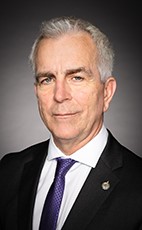
Name:
Marcus Powlowski
Other Role(s):
Nil
Riding:
Thunder Bay–Rainy River
Province:
Ontario
Preferred Language:
English/French
CSC Facilities in Riding:
Nil
Year First Elected:
2019
Past Profession:
Doctor
Statements on the Issue:
- Nil

Name:
Sonia Sidhu
Other Role(s):
Vice-Chair Status of Women
Riding:
Brampton South
Province:
Ontario
Preferred Language:
English/French
CSC Facilities in Riding:
Nil
Year First Elected:
2015
Past Profession:
Healthcare professional
Statements on the Issue
- Shown interest in the outbreak at Mission Institution
- Recently asked a question about the mental health of the correctional staff

Name:
Tony Van Bynen
Other Role(s):
Nil
Riding:
Newmarket–Aurora
Province:
Ontario
Preferred Language:
English
CSC Facilities in Riding:
Nil
Year First Elected:
2019
Past Profession:
Mayor
Statements on the Issue:
- Nil
Conservative Party of Canada

Name:
Tamara Jansen
Other Role(s):
Nil
Riding:
Cloverdale–Langley City
Province:
British Columbia
Preferred Language:
English
CSC Facilities in Riding:
Nil
Year First Elected:
2019
Past Profession:
Business owner
Statements on the Issue:
- Nil

Name:
Matt Jeneroux
Other Role(s):
Vice-Chair HESA
Former Vice-Chair Industry, Science and Technology
Riding:
Edmonton Riverbend
Province:
Alberta
Preferred Language:
English
CSC Facilities in Riding:
Edmonton Institution for Women
Edmonton Institution
Year First Elected:
2015
Past Profession:
Member of the Legislative Assembly of Alberta
Statements on the Issue:
- Showed interest in ensuring the current screening measures by CBSA are working
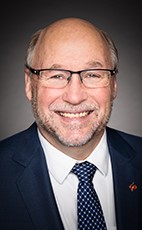
Name:
Robert Kitchen
Other Role(s):
Former Vice-Chair Subcommittee on Sports-Related Concussions in Canada of the Standing Committee on Health
Former Vice-Chair Veterans Affairs
Riding:
Souris–Moose Mountain
Province:
Saskatchewan
Preferred Language:
English
CSC Facilities in Riding:
Nil
Year First Elected:
2015
Past Profession:
Chiropractic Doctor
Statements on the Issue:
- Nil
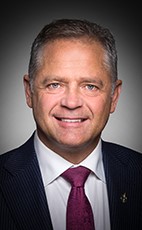
Name:
Len Webber
Other Role(s):
Former Vice-Chair Health
Riding:
Calgary Confederation
Province:
Alberta
Preferred Language:
English
CSC Facilities in Riding:
Nil
Year First Elected:
2015
Past Profession:
Member of the Legislative Assembly of Alberta
Statements relevant to corrections
- Nil
Bloc Québécois
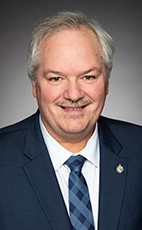
Name:
Luc Thériault
Other Role(s):
Vice-Chair HESA
Riding :
Montcalm
Province:
Quebec
Preferred Language:
French
CSC Facilities in Riding:
Nil
Year First Elected:
2015
Past Profession:
Philosophy Teacher
Statements relevant to corrections
Statements on the Issue:
- Inquired about PPE items provided to correctional staff.
- Showed interest in CSC’s staffing concerns related to the mandatory 14-day quarantines for staff who may have been exposed to the virus.
New Democratic Party
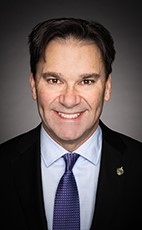
Name:
Don Davies
Other Role(s):
Vice-Chair Canada-China Legislative Association
Riding:
Vancouver Kingsway
Province:
British Columbia
Preferred Language:
English
CSC Facilities in Riding:
Nil
Year First Elected:
2008
Past Profession:
Legal Services, Director
Statements on the Issue:
- Showed interest in CSC’s staffing concerns related to the mandatory 14-day quarantines for staff who may have been exposed to the virus.
- Showed interest in release of offenders due to COVID-19.
- Asked if CSC has taken steps to educate offenders on Public Health Agency of Canada recommendations to limit the spread of COVID-19
